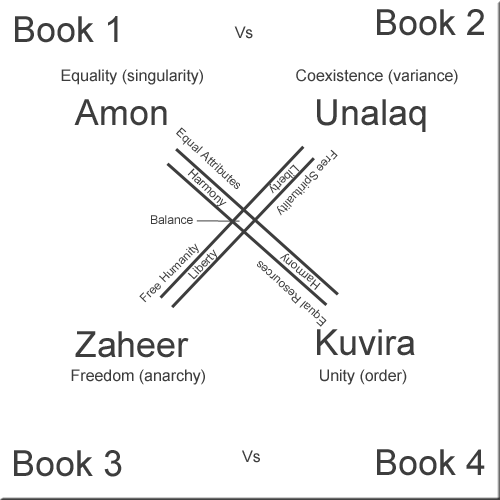I really want to understand why the writers have such a hard-on for Jinora. Anyways, I like Kuvira as an antagonist. She kind of reminds me of Dr. Doom. Her ultimate desire is power and authority, but she doesn't really wish harm upon anyone and she seems to value equality and peace among the people. She genuinely feels that the world will be better off in her hands, and that to simply live and let live is not a world worth living when she knows she can make a difference. While I find the thought process egotistical and childish, I can certainly understand it.
On another note: What Toph said about the antagonists and their extremes was interesting to me. Each of the main antagonists represents a philosophy or virtue taken to the extreme. My take on it (with a touch of my life philosophy) is this:
The entire Avatar series represents an ongoing struggle between two competing, yet complimentary virtues: Harmony and Liberty. There are various names for these two virtues:
Harmony | Unity | Order | Yin
Liberty | Freedom | Chaos | Yang
You see these two ideals competing all throughout the Avatar timeline; since before man, to the first Avatar, to Aang, to Korra. This theme, of course, is most obvious when you take things to the beginning with the primordial spirits Raava and Vaatuu. Raava, of course, is the essence of harmony and order; Vaatus is the essence of liberty and chaos. These two constantly compete with each other for power. Unity and Freedom are both necessary virtues, but when one becomes more valued than the other, you get an extreme that causes unbalance and unrest.
However, as the energy of one increases (that is, as one becomes more extreme), the potential energy for the other increases. Too much freedom naturally brings about the need for order, and too much order naturally brings about chaos. This is first seen with Fire Lord Sozin's ideals. Sozin desired to bring complete unity to the world, but such an extreme ideal only lead to chaos. The one hundred-year war caused such an unbalance in the world that even after Aang succeeded in restoring peace, Korra continues to deal with the residual effects.
The Legend of Korra is about restoring the balance between freedom and unity, left out of sync by the hundred-year war. In each of the books, Korra struggles against one of these two extremes, and the series ultimately seeks to balance itself: Book 1 (Order) compliments Book 2 (Chaos) & Book 3 (Chaos) compliments Book 4 (Order).
Going back to how the abundance of one of the two virtues seems to cause build-up of the other, I think that the transition from book 3 to book 4 is the most prominent example of this. Zaheer desired to end the monarchical oppression in the world (a result of too much order). By eliminating the earth queen, chaos ensued (a result of too much freedom). This surge of chaos prompted, once again, the reaction of extreme order, ie Kuvira.
I really do hope that this book actually wraps this all together. There's so many issues with LoK idonteven. But if they actually follow through with a moral of the story, I wont complain.
Here's another "graph" I made on this philosophy a while back btw.


